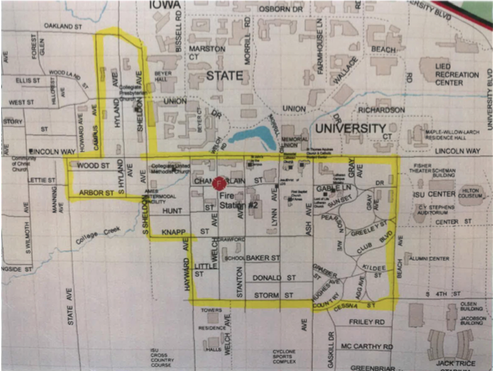City Council covers parking, transportation plans

The area within the yellow line could have increased parking enforcement.
July 11, 2017
City Council met Tuesday night to talk over many things, beginning with a meeting from the Transportation Policy committee and moving on to a report on Campustown Parking.
The 2018-2021 Transportation Improvement Program draft was presented May 23 at a policy meeting, after which it was presented to state partners and a few small changes made. The policy was approved at Tuesday’s meeting.
The Council also heard from staff on what increased parking enforcement in Campustown would mean for city costs. It looks at the area spanning from Beach Avenue on the east to State Avenue on the west, and from Lincoln Way to Storm Street, north to south.
The staff report estimates more than $60,000 in additional costs annually to patrol those areas, which have 4 and 6 hour parking limits and alternate side parking overnight. That $60k cost already considers increased revenue from tickets.
Cost projections are based on a goal of continuous patrol in the areas affected by four and six hour limits from approximately 8:00 a.m. to 6:00 p.m., and overnight alternate side enforcement after the changeover period, according to the staff report.
The report estimated it would require approximately 84 additional Community Safety Officer hours each week. This will require recruiting, training and supervising four to five additional officers, predominantly college students, who will not be available until they return for the fall semester. The report notes it could take several months before an enhanced enforcement effort is fully deployed.
The report also emphasized the importance of letting the neighborhoods know ahead of the increased enforcement, perhaps including a week of warnings before fully ticketing.
Mayor Ann Campbell asked if there had been consideration in changing or standardizing the regulations across the area, where each block on a street can have a different parking sign and regulation.
Council Member Chris Nelson asked if regulation and enforcement should be looked at together or separately. Ames Police Chief Chuck Cychosz felt it would be best to do it as a package so confusion would only happen at one time, and that the regulations should be looked at.
Council Member Gloria Betcher said neighbors are tired of complaining and having enforcement be complaint-driven. Eventually Betcher hopes the regulations would be simplified.
“If we have to go in that direction and not be generous-spirited in how we go from block to block in the regulations, we do have a good example of where the market-driven pricing has actually worked,” Betcher said. “I was happy it was only a net of $60,000. I thought it was going to be much worse than that.”
Betcher moved that they attempt to enforce current regulations for a period of time, especially since the enforcement costs can be broken down by month-to-month. Nelson had concerns that the monthly cost was an averaged cost.
Ames Police Chief Cychosz said there would likely be more costs in the first months for personnel training, but ticketing is also likely to be higher in that time to compensate. Cychosz was also concerned that lack of a full-time parking employee would make that hiring and training period more difficult.
Council Member Amber Corrier pointed out regulations would be discussed along with parking fees when developing the city budget. The council moved to look into enforcing the current regulations.






